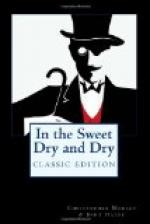“I like to think, my fellow-citizens, that you have conferred this nomination upon me not wholly at random. I like to think that I am only expressing your thought when I say that many drinkers have been the worst enemies of the cause we all hold dear. The alcoholshevik and the I.W.W.—the I Wallow in Wine faction—have done much to discredit the old bland Jeffersonian toper who carried tippling to the level of a fine art. I have no patience with the doctrine of complete immersion. Ever since I was first admitted to the bar I have deplored the conduct of those violent and vulgar revelers who have brought discredit upon the loveliest, most delicate art known to man. Now, at last, by supreme wisdom, drinking is to be elevated to the dignity of a career. I like to think that I express your sentiment when I say that drinking is too precious, too subtle, too fragile a function to be entrusted to the common crowd. Therefore I heartily applaud your admirable intention of entrusting it entirely to me, and look forward with profound satisfaction to the privilege of enshrining and perpetuating in my own person the genial traditions that have clustered round the institution of Liquor. If elected, I shall endeavor to carry on the fine old rituals and pass them down unimpaired to the next incumbent. I shall endeavor to make duty a pleasure, and pleasure a duty. I shall remind myself that I am only performing the service to humanity that each one of you would willingly render if you were in my place.
“My fellow-citizens, I thank you for your amiable confidence, and am happy to accept the nomination.”
There were some who criticized this speech on the ground that it was too academic. It was remembered that Mr. Bleak had at one time been a school-teacher, and his opponents were quick to raise the cry “What can a schoolmaster know about liquor?” It was said that Mr. Bleak was too scholarly, too aloof, too cold-blooded: that his interest in booze was merely philosophical, that he would be incompetent to deal with the practical problems of actual drinking: that he would surround himself with drinks that would be mere puppets, subservient entirely to his own purposes. The adherents of Jerry Purplevein, the nominee of the other party, made haste to assert that Bleak was not a drinker at all but was a tool of the Chuff machine. Jerry was a former bartender who had been pining away in the ice-cream cone business. Huge banners appeared across the streets, showing highly colored pictures of Mr. Purplevein plying his original profession, with the legend:
Rally round the flagon
Vote for
Purplevein
The practical man
One of the exciting features of the campaign was the sudden appearance of a Woman’s Party, which launched an ably-conducted boom for a Woman Souse and nominated Miss Cynthia Absinthe as its candidate. The idea of having a woman elected to this responsible office was disconcerting to many citizens, but Miss Absinthe’s record (as outlined by her publicity headquarters) compelled respect. She was reputed to have been a passionate and tumultuous consumer of sloe gin, and thousands of women in white bartenders’ coats marched with banners announcing:




